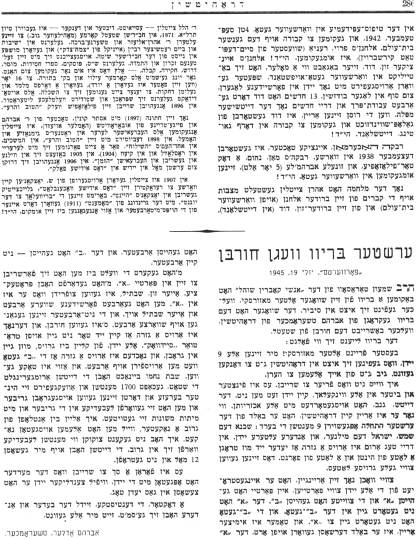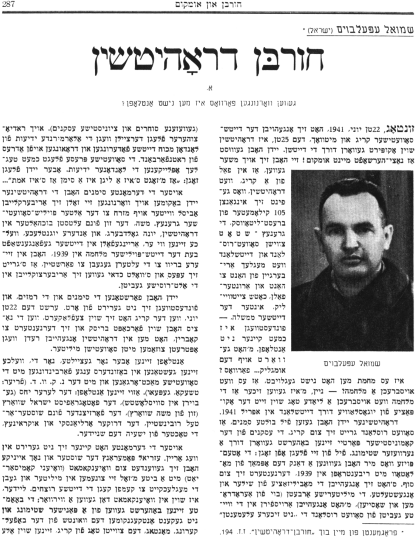Previous Page
|
Next Page

[Page 286]
died in the typhus epidemic in the Warsaw Ghetto on September 4, 1942, and was buried in the Gensher cemetery. Elchanan's wife Renya (a sister of Polish parliament member Kirshbaum) perished. May G-d avenge her blood! Elchanan's only son, David, a very talented painter, participated in the Warsaw ghetto uprising, and was later taken away with other Jews to various camps, and finally to the Buzhin camp. David spent 13 months there in slave labor, and three months after Germany's defeat, when the Russian arrived, David died from tuberculosis and was buried in the village of Gauting, Germany. May
G-d avenge his blood!
Rivka Hocherman, the only daughter, died in December 1938 in Warsaw. Her husband Nachum, who had a PhD in Philosophy, and their son Avrahamele (5 years old), perished in the Warsaw ghetto. May G-d avenge their blood!
After the war, Aharon Zeitlin set up gravestones on the graves of his brother Elchanan (in the Warsaw cemetery) and his nephew David (in Germany).
R. Hillel Zeitlin, essayist, poet and thinker, was born in June, 1871 in the Lubavitch chassidic town of Korma (Mohilev gubernia) to his parents R. Aharon Eliezer and Cherna Bracha. He studied in yeshivas and under the Retchitz Rebbe (a grandson of the third Lubavitcher rebbe known as the Zemach Zedek), and was influenced intellectually by Lubavitch chassidic ideas. He was famous for his rare memory and dedication to study. He studied Talmud, rabbinical law, Chassidism, ethical teachings, homiletics, philosophical inquiry and kabbalah – whatever he could get his hands on. While a young person, he became renowned as a genius and expert Torah knowledge. At 16 (his father had become impoverished) R. Hillel became a religious teacher in a village and suffered deprivation. He then became drawn to the Haskalah movement, and studied languages on his own, and studied world literature. In 1896 he began writing his philosophical work, Good and Evil.
After he married Esther Kunin (a daughter of R. Avraham and Faige Traina of Uvaravitch, Gomel district) in 1897, Zeitlin began teaching Hebrew at Ratner's gymnasia high school in Gomel. In 1898, he published Good and Evil in a series in Hashiloach [The Dispatch], the publication of the writer Ahad Ha'am. Zeitlin briefly became involved in teaching in Roslavl and Kiev (1904). In 1905 he moved to Vilna and wrote in the Hebrew publication, Hazman [Time]. In 1906 he first started to publish in Yiddish in the publication Dos Yiddishe Folk [The Jewish People].
In 1907 Zeitlin was asked by S. Yatzkan to serve as editor of Dos Yiddishe Vachenblatt [The Jewish Weekly], and also wrote for Yatzkan's Heint [Today]. Zeitlin's “Letters to Youth” were highly acclaimed, and when Moment (1911) was founded he became one of its main contributors until he perished. May G-d avenge his blood!
FIRST LETTER ABOUT THE DESTRUCTION
The Forverts, July 19, 1945
Rabbi Shimon Tarasov of the Kobrin synagogue received a letter from his brother-in-law, Alter Mazursky, who is now in Siberia. The brother-in-law received the letter from Avraham Tcheromcher of Drohitchin, who describes the destruction of the town. The letter is as follows:
My dearest friend Alter Mazursky! All nine of us Jews located currently in Drohitchin are healthy, thank G-d. May G-d allow us to hear from you. I don't know where to start. There is darkness and bitterness everywhere, and there are no Jews around. The German thieves cruelly murdered people. As soon as they arrived in Drohitchin, they shave off the beards of nine men: Shachna the Synagogue Custodian, Yisrael the Miller and other elderly Jews. Three days later a decree was issued that Jews were to wear a patch on their front and back. They were two large yellow patches.
Two weeks after they arrived, they divided all the Jews into two groups. One group were identified as “A” and the other “B.” Group A couldn't enter the Group B ghetto, and Group B couldn't enter the Group A ghetto. If someone did go in, he would be immediately shot on the spot. Group A were called workers and Group B were non-workers.
You had to turn the world upside down to be made part of Group A, and you needed connections. Your son Shabsel was happy to be part of Group A. They did hard work, and so did Shabsel. It was chaos and destruction. Thereafter, another decree was issued, saying that no Jew could walk on the sidewalk. All Jews, young and old, would have to walk on the street. Then came a decree specifying that the Group B ghetto would also be taken to work. On the Sabbath evening after the Ninth of Av the Germans surrounded the town, grabbed 1700 men and took them out to the Bereza Forest, where they dug trenches and got thrown in to the trenches alive, and then died horrible deaths. I escaped naked from a trench. Everyone was told to undress. I was unable to see how people were thrown alive into the trench. The Germans shot at me 12 times and missed.
There are many things to write about what the killers did to the Jews, how many dozens of Jews were shot on the street every day. A doctor, the female dentist, Zeidel the bathhouse attendant and others poisoned themselves. Stay well everybody.
Avraham Adler of Tcheramcha

[Page 287]
Shmuel Eppelbaum (Israel)*
[photo:] Shmuel Eppelbaum
CHORBAN DROHITCHIN
[DESTRUCTION OF DROHITCHIN]
1.
People were warned. Why didn't they flee?
Sunday, June 22, 1941. The Soviet-German War had begun, and on Wednesday June 25, Drohitchin was already occupied by the Germans, and Jews knew that Nazi rule meant extermination! They also figured that in the event of a war, Drohitchin, which was located only 105 kilometers from Brest-Litovsk (the border city between Soviet Russia and Germany), would possibly go back and forth, and eventually fall into the hands of the Germans. Yet almost no one fled. They waited for the tragedy. Why? Was it because no one believed there would be a war? No, we were sure that war would break out any minute following the occupation by Germany in April 1941.
Jews in Drohitchin saw unmistakable signs that the Soviets were preparing for war. The community Communist leaders were extremely nervous, and openly stated that the pause won through the Molotov-Ribbentrop Agreement in 1939 was approaching its end. Conscription of students and employees had begun. Military construction began (airports and highways) were being built, and the so-called “unsafe elements” (former businessmen and Zionist activists) were sent to far-flung areas of the Soviet Union. People listening to the radio heard alarming reports from London about German demands and threats against the Soviets, and the Soviet press denied the London reports almost on a daily basis. Jews, however, would say that whenever a report was called a lie, this was a sign that the report was true.
In addition to the aforementioned signs, the Jews of Drohitchin also received warnings to move further eastward to the old Polish-Soviet border area. Moshe, the son of Yonah Goldberg, the oldest bookkeeper in Drohitchin, and other young people who had been captured by the Germans during the German-Polish War of 1939 wrote their parents that something was going to happen, and that it was worth moving further into old Russian areas.
Jews understood the signs and hints, and then didn't move away. Only on June 22, when the war broke out as the Nazis captured Brisk and approached Kobrin, did people in Drohitchin start talking about retreating with the Soviet army.
Only a few people fled – those who were specifically connected to the Soviet authorities and the NKVD (formerly the CHEKA and GEPEO). These included the teacher Yachas (born in Svislotch), the photographer Yisrael Schwartz (son of Moshe Schwartz), the chairman of the shoemakers' workshop, Rubinstein, the printer Orliansky and Ukrainetz, and finally the daughter of Yeshayahu the Tailor.
No one aside from the aforementioned individuals left Drohitchin. Ezriel Pomerantz, the shoemaker, and a few others contacted the military commissariat to request to be drafted into the army so they could fight the German murderers. Unfortunately, the officials were in a panic, and couldn't respond to the request of the population. On Monday, the second day of the war, all Soviet offices were closed.
Previous Page
|
Next Page
This material is made available by JewishGen, Inc.
and the Yizkor Book Project for the purpose of
fulfilling our
mission of disseminating information about the Holocaust and
destroyed Jewish communities.
This material may not be copied,
sold or bartered without JewishGen, Inc.'s permission. Rights may be
reserved by the copyright holder.
JewishGen, Inc. makes no representations regarding the accuracy of
the translation. The reader may wish to refer to the original material
for verification.
JewishGen is not responsible for inaccuracies or omissions in the original work and cannot rewrite or edit the text to correct inaccuracies and/or omissions.
Our mission is to produce a translation of the original work and we cannot verify the accuracy of statements or alter facts cited.
 Drogichin, Belarus
Drogichin, Belarus
 Yizkor Book Project
Yizkor Book Project
 JewishGen Home Page
JewishGen Home Page
Yizkor Book Director, Lance Ackerfeld
This web page created by Lance Ackerfeld
Copyright © 1999-2025 by JewishGen, Inc.
Updated 13 Dec 2001 by LA

 Drogichin, Belarus
Drogichin, Belarus
 Yizkor Book Project
Yizkor Book Project
 JewishGen Home Page
JewishGen Home Page